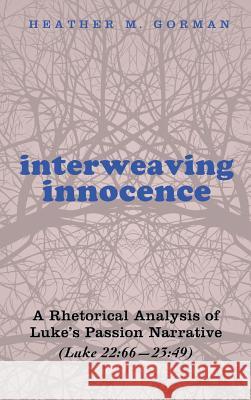Interweaving Innocence » książka
Interweaving Innocence
ISBN-13: 9781498224758 / Angielski / Twarda / 2015 / 208 str.
Interweaving Innocence
ISBN-13: 9781498224758 / Angielski / Twarda / 2015 / 208 str.
(netto: 173,28 VAT: 5%)
Najniższa cena z 30 dni: 179,93
ok. 16-18 dni roboczych.
Darmowa dostawa!
In this study Heather Gorman analyzes Lukes portrayal of Jesus death in light of the ancient rhetorical tradition, particularly the progymnasmata and the rhetorical handbooks. In addition to providing a detailed, up-to-date exegetical study of Luke 22:66--23:49, she argues three things. First, through the strategic placement of rhetorical figures and the use of common topics associated with refutation and confirmation, Luke structures his passion narrative as a debate about Jesus innocence, which suggests that one of Lukes primary concerns is to portray Jesus as politically innocent. Second, ancient examples of synkrisis suggest that part of the purpose of Lukes characterization of Jesus in the passion narrative, especially when set in parallel to Paul and Stephen in Acts, was to set up Jesus as a model for his followers lest they face similar persecution or death. Third, Lukes special material and his variations from Mark are explicable in terms of ancient compositional techniques, especially paraphrase and narration, and thus recourse to a special Passion Source is unnecessary.""With careful analysis and clear prose Gorman provides a new lens for exploring some of the most oft-debated features of Lukes passion narrative. Highlighting practices from classical rhetoric, Gorman makes a compelling case for Lukes careful shaping of Mark to reinforce his emphasis on Jesuss political innocence. In this way, Gorman firmly establishes Jesuss innocence as a primary theme in Lukes account, one that stands as a model for Jesuss disciples in Acts and beyond."" --Alicia D. Meyers, Assistant Professor of New Testament and Greek, Campbell University Divinity School""In Interweaving Innocence, Dr. Gorman brings a fresh look at Lukes passion narrative. She helpfully moves the discussion on the formation and shape of Lukes passion narrative beyond simple source critical solutions. Employing a sophisticated knowledge of ancient rhetorical practices, the well-argued thesis is that Lukes rhetorical-composition technique adequately explains significant variations from Marks account without recourse to a non-canonical source. This is a must-read for Lukan scholars.""--Mark A. Matson, Associate Professor of Bible, Milligan College; cochair, Gospel of Luke section, SBL Annual MeetingHeather M. Gorman, PhD, is Assistant Professor of New Testament at Johnson University in Knoxville, Tennessee.











